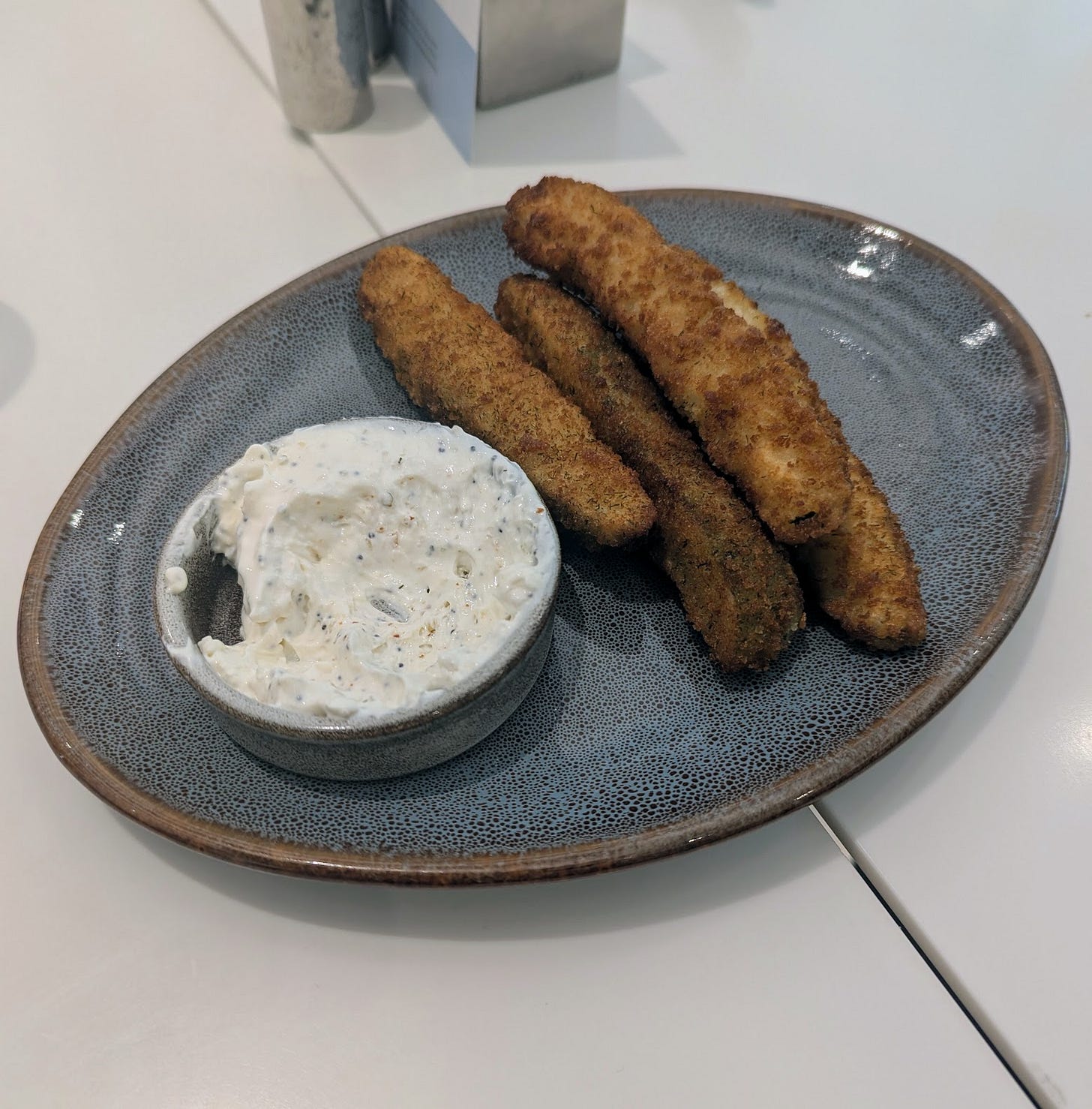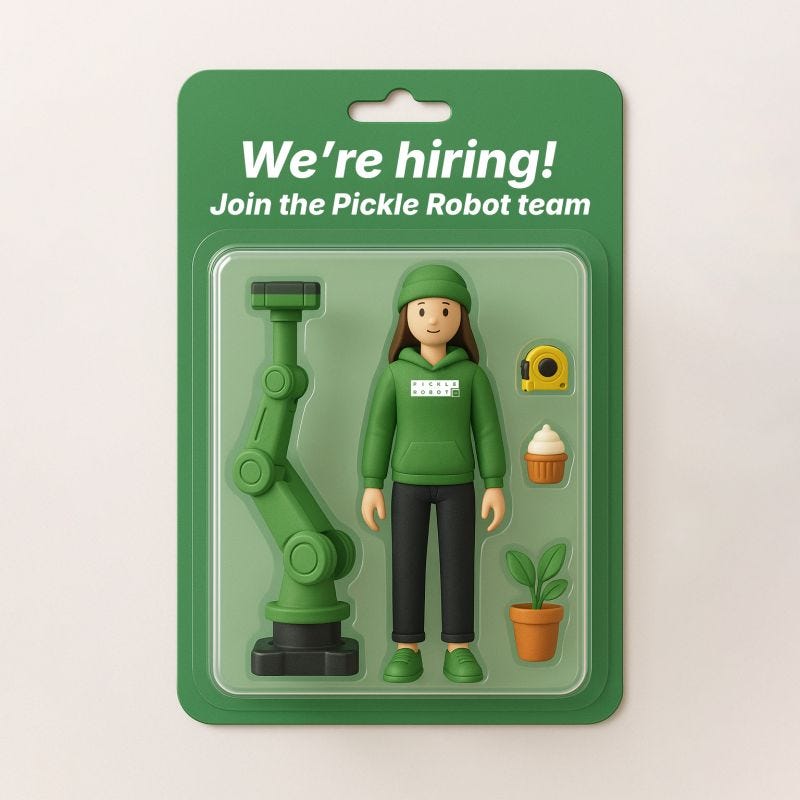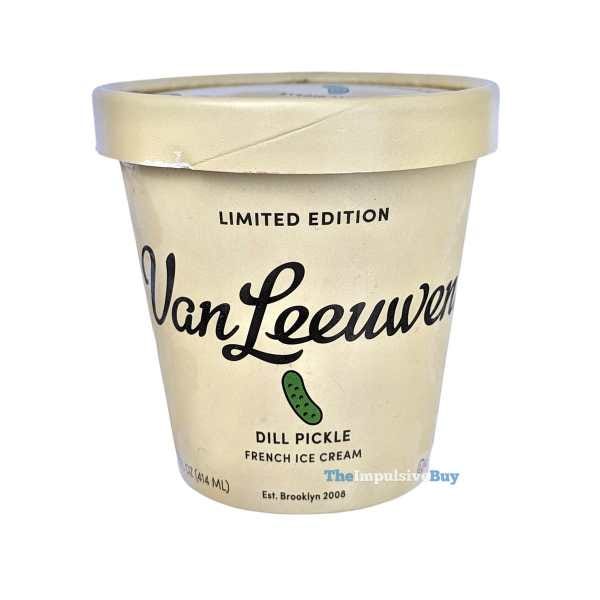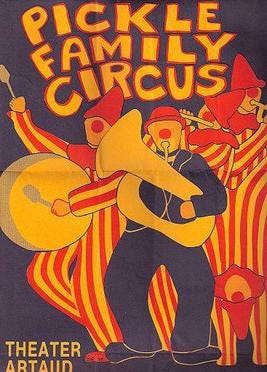A long and tangy post! Click on the headline to read it in a browser or in the Substack app.
You may have heard of the frequency illusion: the cognitive bias toward noticing a word, object, or trend more frequently after you first hear of it. “Frequency illusion” was coined in 2005 by the linguist Arnold Zwicky, who is also responsible for “recency illusion” (the false belief that a long-established word or phenomenon is new) and “libfix” (a “liberated affix” like -thon in “walkathon” and cran- in “cranapple”).
I mention the frequency illusion because lately my curiosity has been piqued by one: I’m seeing pickles everywhere.
Eat a pickle
It started with a snack.

A couple of weeks ago I visited the Skirball Cultural Center in Los Angeles with my brother Michael, and we decided to have a little nosh on the premises at Zeidler’s Cafe. The Skirball is a Jewish museum, and Zeidler’s menu claims to “embrace Jewish culture,” but neither of us had ever heard of “kosher dill pickle fries,” which we at first thought were pickle-flavored french fries, and which sounded more Midwestern than Middle Eastern. But I later found fried-pickle recipes on many Jewish cooking sites, including Kosher.com and Jewish Boston, so obviously I had been woefully underinformed. Zeidler’s fried pickles were good, and so was the dip. Here’s is a paywall-free New York Times recipe for everything bagel dip that may or may not resemble what I had in L.A.
Shop at Pickle
Next, I stumbled upon a story in The Cut about a new shopping app called Pickle, which “aims to be the Airbnb or Uber of clothing rentals” — that is, it’s a peer-to-peer system that eliminates the middleman, unlike, say, Rent the Runway. The story didn’t explain the company’s name, so I used Pickle’s contact form to send a query. To my surprise — I usually get nowhere with such questions — I got a quick and earnest response from a PR rep: “The name comes from the fact that if you’re in a Pickle [capital P sic] and need something great to wear, you can access it on Pickle.”
This wasn’t what I’d expected; I’d figured the name was a play on “picking” a wardrobe. And in fact one of the images I found for the app — probably an older version — traded on that very association. “Pick with Pickle,” it said. The image also turned the Ps in Pick and Pickle into question marks. Neither the punctuation nor the slogan survives in the current design.
A historical digression
But let’s take a minute anyway to look at “in a pickle” and other pickle-y usages.
English pickle “probably” came, in the 1400s, from Dutch pekel, which means “brine” or “brined food”; its origin may (or may not) be a medieval Dutch fisherman named Pekel who invented the process. Etymonline says that the colloquial figurative sense of “‘a sorry plight, a state or condition of difficulty or disorder’ is recorded by 1560s, from the time when the word still meant a sauce served on meat about to be eaten.” (Shakespeare is believed to have the first writer to use in a pickle to mean “in trouble”; it appears in The Tempest, 1623.) Pickled has been American slang for “drunk” since about 1900, and baseball is also fond of pickle: It’s a synonym for a rundown, a situation in which a baserunner is stranded between bases.
It’s not just baseball, either
Pickle has crept into a lot of British and North American slang, some of it smutty, some not. Green’s Dictionary of Slang has a jarful of pickle expressions, including picklepuss (“a sour-faced individual”), pickle-kisser (“a male homosexual”), pickle smasher (“a prostitute”), and pickles! (“nonsense! rubbish!”).
The pickle prompt
On the very same day — April 15 — that I read The Cut’s story about the Pickle shopping app I was served
’s brief essay about pickles, inspired by the writing prompt “Write for three minutes about anything”:If I could write about anything I might start with pickles because pickles make everything better, they cover a multitude of sins, they take over the taste of a lousy hamburger, I would write about sweet pickles which I eat by themselves, or pickle relish which I put in egg salad or mix up with something I can’t remember and put it on fish or maybe not fish, maybe just, oh, I know, a hot dog which otherwise is not nearly as delicious.
Check out the rest of it; she’s a charming writer.
Pickle-ish brands
Pickle isn’t just for shopping:
Pickle is a Substack newsletter written by
; it’s called Pickle, she says, “because there’s something about seasoning and time that creates the thing, the salty twangy bit which brings all other parts into harmony. Fermentation is just moments at work to prove the one true thing I know: There is magic in change.” (Emphasis in the original.) The cover image is a fabulous photo of what’s come to be called the Pickle Sisters; they may have been a 1920s vaudeville act, or they may have just been four unrelated women wearing pickle costumes for secret reasons:

Pickle.com is a San Francisco AI startup (is there any other kind of San Francisco startup?) that promises to “replace your camera on Zoom, Twitch, TikTok and more.” No explanation for the name; the logo is one of those AI buttholes.
Pickle Robot, based in Cambridge, Mass., makes “physical AI for supply chain automation.” No explanation for the name; maybe from someone’s pronunciation of “physical”?

Cute! Via LinkedIn. Mr. Pickle’s Sandwich Shop, established in 1995, has locations in California and Arizona. The website sells Pickle Gear, including a goofy-looking Mr. Pickle’s plush toy. This Mr. Pickle’s is probably unrelated to Mr. Pickles, an American adult animated horror comedy slasher series that aired for four seasons beginning in 2014; the title came from the name of the “satanic” border collie in the show.
Pickle 99.3 is WPKL, an FM radio station in Uniontown, Pennsylvania, that airs oldies music. It started life in 1968 as WPQR and was reborn in 2001 as WPKL. Via Wikipedia: “No real information on why ‘The Pickle’ was chosen as their name (it’s believed that the name was an homage to Pittsburgh’s Heinz foods, which also produces pickles.”
Pickles of yore
The Pickle Family Circus (1974–2003) was a small, delightful circus based in San Francisco. Its members included Larry Pisoni, Bill Irwin, and Geoff Hoyle (clowns) and Shana Carroll (acrobatics); Irwin and Hoyle went on to have distinguished careers as actors and monologists, and Carroll became a performer and choreographer at Cirque du Soleil and later founded her own Montréal-based circus company, Les Sept Doigts. I asked Carroll’s father, Jon Carroll — who wrote a book about the Pickles, as they were known — why “pickle” was in the company’s name. His reply: “Because it was a funny word. Everybody laughed when you said pickle.” Must be that comedic K sound.
Pickleball, of course
The ridiculously popular paddle sport, which I have never played1, is older than you may think.2 It was invented as a children’s sport in 1965, on Bainbridge Island in Washington State; in 2021 it named the state’s official sport. There is some dispute about the origin of the pickleball name; one story says it came from pickle boat, which can mean either the last boat to finish a race or a boat with a thrown-together (“pickup”) crew. Or it may have been named in honor of Pickles, a dog belonging to one of the inventors. The authors of a history of the sport proposed a third possibility: one of the sport’s inventors enjoyed hitting the ball in a way that would put an opponent “in a pickle.”
Pickles and ice cream
What pregnant women are stereotypically said to crave.

The last word
Belongs to Arlo Guthrie: “I don’t want a pickle / I just want to ride on my motor-cickle.”
I avoid all sports that take the verb “to play.”
Recency illusion!







Pickle is a great topic! And I loved the reminder of the Pickle Family Circus - they used to travel along the west coast through small towns, setting up in the city parks and delighting children everywhere. I'm so glad to learn about the book about their heyday!
May I nominate the timely Italian word “papabile”? It means a likely contender for being the next pope—a “popeable.”